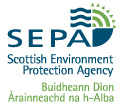
Dangerous goods, abbreviated DG, are substances that when transported are a risk to health, safety, property or the environment. Certain dangerous goods that pose risks even when not being transported are known as hazardous materials. An example for dangerous goods is hazardous waste which is waste that has substantial or potential threats to public health or the environment.

The Scottish Environment Protection Agency is Scotland's environmental regulator and national flood forecasting, flood warning and strategic flood risk management authority. Its main role is to protect and improve Scotland's environment. SEPA does this by helping business and industry to understand their environmental responsibilities, enabling customers to comply with legislation and good practice and to realise the economic benefits of good environmental practice. One of the ways SEPA does this is through the NetRegs environmental guidance service. It protects communities by regulating activities that can cause harmful pollution and by monitoring the quality of Scotland's air, land and water. The regulations it implements also cover the storage, transport and disposal of radioactive materials.

The Environmental Protection Act 1990 is an Act of the Parliament of the United Kingdom that as of 2008 defines, within England and Wales and Scotland, the fundamental structure and authority for waste management and control of emissions into the environment.
The Ionising Radiations Regulations (IRR) are statutory instruments which form the main legal requirements for the use and control of ionising radiation in the United Kingdom. There have been several versions of the regulations, the current legislation was introduced in 2017 (IRR17), repealing the 1999 regulations and implementing the 2013/59/Euratom European Union directive.
When the Climate Change Levy was introduced in the United Kingdom, the position of energy-intensive industries was considered, given their energy usage, the requirements of the Integrated Pollution Prevention and Control regime and their exposure to international competition. As a result, a 65% discount from the levy was allowed for those sectors that agreed targets for improving their energy efficiency or reducing carbon emissions. The discount on electricity increased to 90% in 2013.
Naturally occurring radioactive materials (NORM) and technologically enhanced naturally occurring radioactive materials (TENORM) consist of materials, usually industrial wastes or by-products enriched with radioactive elements found in the environment, such as uranium, thorium and potassium and any of their decay products, such as radium and radon. Produced water discharges and spills are a good example of entering NORMs into the surrounding environment.
The Water Supply Regulations 1999 are regulations imposed on the England and Wales Water industry by Statutory Instrument.
Contaminated land contains substances in or under the land that are definitively or potentially hazardous to health or the environment. These areas often have a long history of industrial production and industrial farming. Many sites may be affected by their former uses such as mining, industry, chemical and oil spills and waste disposal. Areas that were previously industrial areas, called brownfield sites, are higher risk areas.
Title 40 is a part of the United States Code of Federal Regulations. Title 40 arranges mainly environmental regulations that were promulgated by the US Environmental Protection Agency (EPA), based on the provisions of United States laws. Parts of the regulation may be updated annually on July 1.

Water quality laws govern the protection of water resources for human health and the environment. Water quality laws are legal standards or requirements governing water quality, that is, the concentrations of water pollutants in some regulated volume of water. Such standards are generally expressed as levels of a specific water pollutants that are deemed acceptable in the water volume, and are generally designed relative to the water's intended use - whether for human consumption, industrial or domestic use, recreation, or as aquatic habitat. Additionally, these laws provide regulations on the alteration of the chemical, physical, radiological, and biological characteristics of water resources. Regulatory efforts may include identifying and categorizing water pollutants, dictating acceptable pollutant concentrations in water resources, and limiting pollutant discharges from effluent sources. Regulatory areas include sewage treatment and disposal, industrial and agricultural waste water management, and control of surface runoff from construction sites and urban environments. Water quality laws provides the foundation for regulations in water standards, monitoring, required inspections and permits, and enforcement. These laws may be modified to meet current needs and priorities.

Waste management laws govern the transport, treatment, storage, and disposal of all manner of waste, including municipal solid waste, hazardous waste, and nuclear waste, among many other types. Waste laws are generally designed to minimize or eliminate the uncontrolled dispersal of waste materials into the environment in a manner that may cause ecological or biological harm, and include laws designed to reduce the generation of waste and promote or mandate waste recycling. Regulatory efforts include identifying and categorizing waste types and mandating transport, treatment, storage, and disposal practices.

Fracking in the United Kingdom started in the late 1970s with fracturing of the conventional oil and gas fields near the North Sea. It was used in about 200 British onshore oil and gas wells from the early 1980s. The technique attracted attention after licences use were awarded for onshore shale gas exploration in 2008. The topic received considerable public debate on environmental grounds, with a 2019 high court ruling ultimately banning the process. The two remaining high-volume fracturing wells were supposed to be plugged and decommissioned in 2022.

Natural Resources Wales is a Welsh Government sponsored body, which became operational from 1 April 2013, when it took over the management of the natural resources of Wales. It was formed from a merger of the Countryside Council for Wales, Environment Agency Wales, and the Forestry Commission Wales, and also assumed some other roles formerly performed by the Welsh Government.

The Continental Shelf Act 1964 is a UK Act of Parliament that governs drilling for oil on the continental shelf around the British Isles. It extended the land regime to areas outside UK territorial waters, where international law recognised the UK right to the seabed, subsoil and natural resources.







